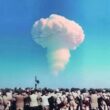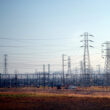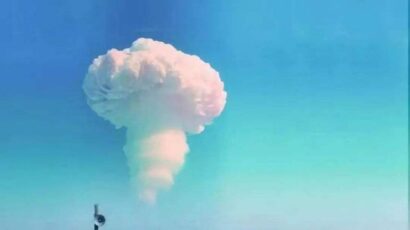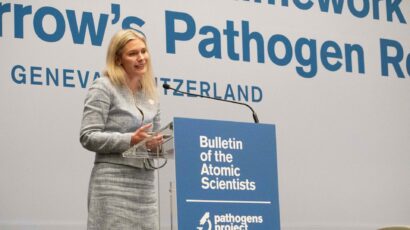Action, not arguments
By Jaime Aguirre Gómez, September 20, 2013
In Round One, my colleagues and I largely agreed that a nuclear detonation, whether deliberate or accidental, would affect states and individuals in very severe ways, and the harm would not be constrained by borders. History substantiates this: Past detonations have carried disastrous consequences, both immediate and long-term, and this has held true (albeit in different ways) both for nuclear tests and for detonations in wartime. And yet, though political circumstances have changed greatly since massive stockpiles of nuclear weapons were established during the Cold War, the world continues to be threatened by nuclear weapons’ destructive potential.
In his Round Two essay, Siddharth Mallavarapu brought the conversation around to ways in which humanitarian issues can be incorporated into arguments that nuclear weapons must be abolished. In my view, arguments are not what is needed. Instead, states without nuclear weapons must exert effective pressure on states with nuclear weapons, until complete consensus has finally been reached that the possession and use of nuclear weapons must be outlawed.
In March 2013, a conference in Oslo on the humanitarian impact of nuclear weapons represented a major step toward making nuclear detonations a thing of the past. The two-day meeting attracted representatives from more than 125 countries, a number of UN and nongovernmental organizations, and many media organizations. Unfortunately, none of the countries recognized as nuclear weapon states under the Nuclear Non-Proliferation Treaty participated (though, among nuclear-armed countries outside the treaty, India and Pakistan were represented).
Mexico emerged as host of a planned follow-up conference, scheduled for early 2014. Mexico is an appropriate choice. It has been officially opposed to nuclear weapons since 1967, when it signed and ratified the Treaty of Tlatelolco, which established Latin America and the Caribbean as a nuclear-weapon-free zone. The significance of the follow-up conference lies partly in the fact that continuity is crucial in disarmament initiatives. States without nuclear weapons must exert strong pressure if nuclear detonations are to be outlawed—but the pressure must be sustained.
Arguments in favor of nuclear disarmament are extremely strong. They are also very well known. So now is not the time for new arguments. Now is the time for sustained, energetic work that leads to a treaty banning nuclear detonations.
Accumulated knowledge. I would like to bring out an additional point: Though nuclear weapons must be abolished, the same does not hold true in my opinion for nuclear energy. Atomic energy’s origins, wrapped up as they are in the development and use of nuclear weapons during World War II, are unfortunate. But over the last 70 years, human beings have developed enormous knowledge about "atoms for peace." This knowledge, whose applications run from energy to industry to medicine, has produced greater quality of life and longer life expectancies.
More specifically, people have learned valuable lessons from accidents such as those that took place at Chernobyl and at the Fukushima Daiichi Nuclear Power Station. People can disagree heatedly about nuclear power, but practices in fields such as radiological safety and transport safety are steadily improving. Emergency preparedness, waste management, and security against terrorist acts are improving as well. I would argue that accidents are not the most pressing danger associated with nuclear energy; corrupt or malicious insiders are much more worrisome. But the ultimate danger is nuclear weapons themselves.
Topics: Nuclear Energy, Nuclear Weapons
Share: [addthis tool="addthis_inline_share_toolbox"]














